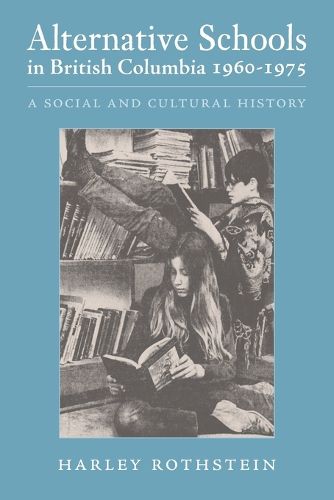Readings Newsletter
Become a Readings Member to make your shopping experience even easier.
Sign in or sign up for free!
You’re not far away from qualifying for FREE standard shipping within Australia
You’ve qualified for FREE standard shipping within Australia
The cart is loading…






This title is printed to order. This book may have been self-published. If so, we cannot guarantee the quality of the content. In the main most books will have gone through the editing process however some may not. We therefore suggest that you be aware of this before ordering this book. If in doubt check either the author or publisher’s details as we are unable to accept any returns unless they are faulty. Please contact us if you have any questions.
The tumultuous 1960s was an era of the counterculture, political activism, and resistance to authority. Conventions and values were challenged and new approaches to education captured the imaginations of parents, teachers, and students. Reacting against the one-size-fits-all nature of the traditional public school system, groups of parents and teachers in Canada and the United States established alternative schools or "free schools" based on the Progressive, child-centred philosophy of John Dewey and the Romantic ideas of Summerhill founder A.S. Neill. In Alternative Schools in British Columbia, 1960-1975, Harley Rothstein tells the story of ten such schools that arose in the province of British Columbia.
Drawing on 350 self-conducted interviews, newspaper articles, personal journals, and school records, Dr. Rothstein invites readers to experience the early days of alternative schools. He describes the educational philosophy, curriculum, and governance of these institutions, and introduces readers to the people who were at the heart of alternative communities. Tracing the evolution, successes, and challenges of each school, he presents the day-to-day experience and brings to life the ethos of the 1960s era. Historians, educators, and all curious readers will become immersed in this engaging account of a group of educational pioneers on Canada's west coast, and how they inspired the liberalization of the public school system that would come in the 1970s.
$9.00 standard shipping within Australia
FREE standard shipping within Australia for orders over $100.00
Express & International shipping calculated at checkout
This title is printed to order. This book may have been self-published. If so, we cannot guarantee the quality of the content. In the main most books will have gone through the editing process however some may not. We therefore suggest that you be aware of this before ordering this book. If in doubt check either the author or publisher’s details as we are unable to accept any returns unless they are faulty. Please contact us if you have any questions.
The tumultuous 1960s was an era of the counterculture, political activism, and resistance to authority. Conventions and values were challenged and new approaches to education captured the imaginations of parents, teachers, and students. Reacting against the one-size-fits-all nature of the traditional public school system, groups of parents and teachers in Canada and the United States established alternative schools or "free schools" based on the Progressive, child-centred philosophy of John Dewey and the Romantic ideas of Summerhill founder A.S. Neill. In Alternative Schools in British Columbia, 1960-1975, Harley Rothstein tells the story of ten such schools that arose in the province of British Columbia.
Drawing on 350 self-conducted interviews, newspaper articles, personal journals, and school records, Dr. Rothstein invites readers to experience the early days of alternative schools. He describes the educational philosophy, curriculum, and governance of these institutions, and introduces readers to the people who were at the heart of alternative communities. Tracing the evolution, successes, and challenges of each school, he presents the day-to-day experience and brings to life the ethos of the 1960s era. Historians, educators, and all curious readers will become immersed in this engaging account of a group of educational pioneers on Canada's west coast, and how they inspired the liberalization of the public school system that would come in the 1970s.